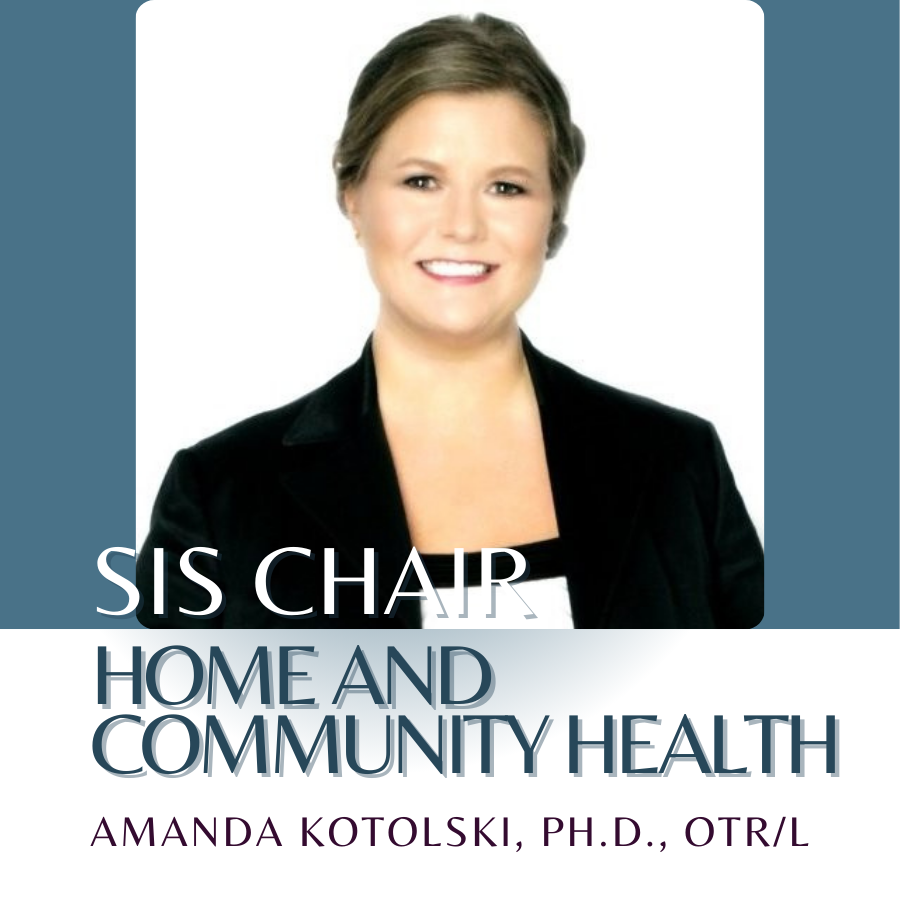 Home and community health therapy services post Public Health Emergency (PHE)
Home and community health therapy services post Public Health Emergency (PHE)
Amanda Kotolski, Ph.D., OTR/L
 Home and community health therapy services post Public Health Emergency (PHE)
Home and community health therapy services post Public Health Emergency (PHE)
Amanda Kotolski, Ph.D., OTR/L
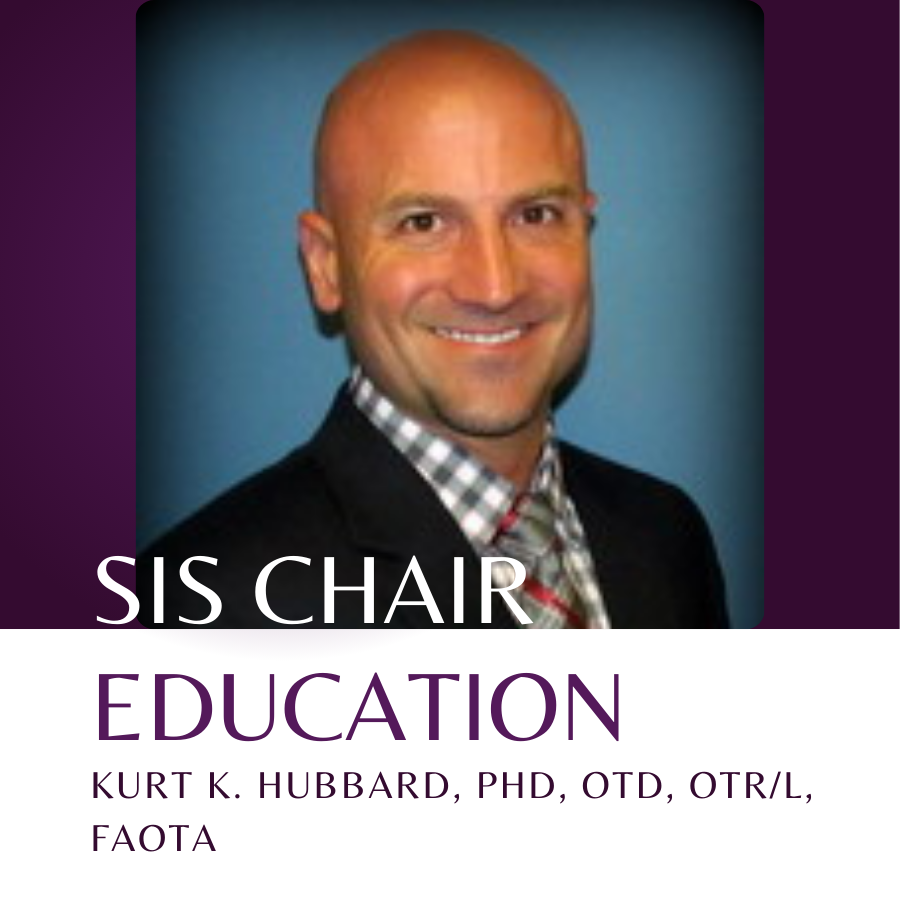 A critique of the meshing hypothesis:
A critique of the meshing hypothesis:
Using Shulman’s knowledge domain theory to facilitate effective instruction
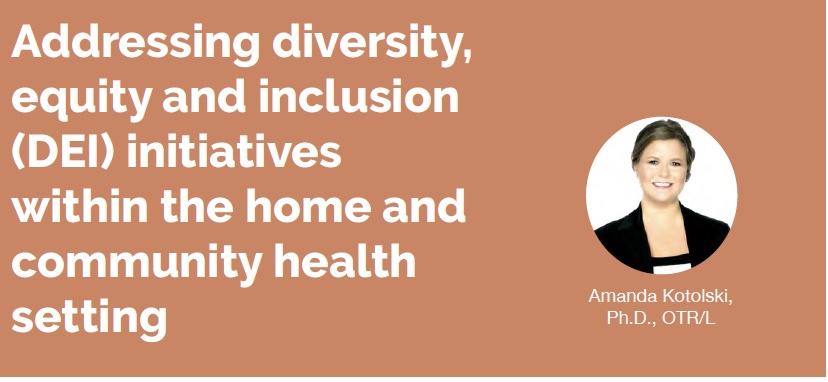
The American Occupational Therapy Association’s (AOTA’s) Vision 2025 conveys a strong commitment to diversity, equity, and inclusion (2020a). It is everyone’s right to feel welcomed, valued, included, and respected while engaging in daily life regardless of each of our own unique abilities and challenges. This statement made by AOTA supports efforts to increase diversity, equity, and inclusion (DEI) within all aspects of occupational therapy, including practice, education, and research, as well as policy development and advocacy (AOTA, 2020a). Therapist’s working in the home and community setting provides important client-centered services of which DEI principles implicitly embrace.
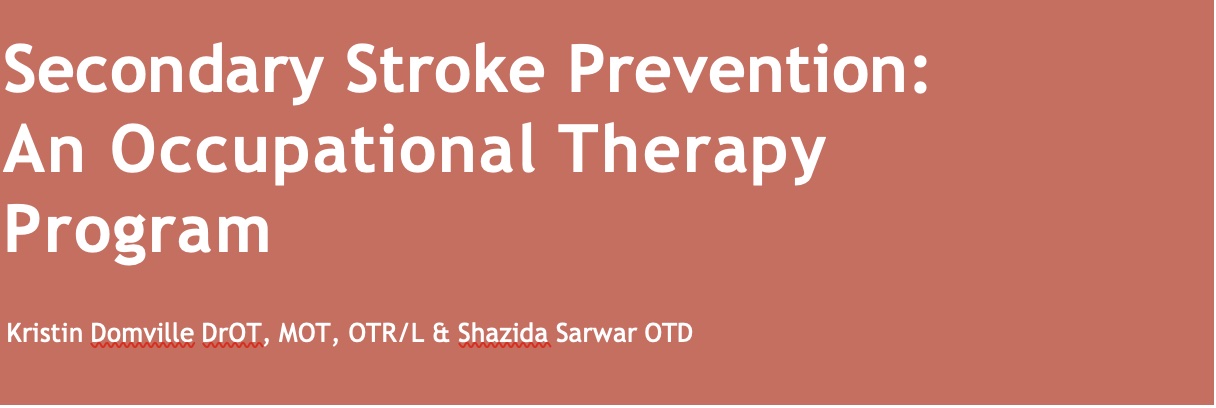
In the United States, a stroke occurs approximately 800,000 individuals annually, accounting for a large population of severe long-term disabilities (Centers for Disease Control and Prevention [CDC], 2021). In the United States, 25% of all strokes, approximately 610,000, occur among those individuals who have already had a previous stroke, raising the risks of long-term disability (CDC, 2021). NORD (2020) reports stroke recurrence leads to poorer functional outcomes, quality of life, and increased incidence of mortality. Stroke recurrence affects a large population, so reducing secondary stroke is essential to reduce mortality and disability risks.
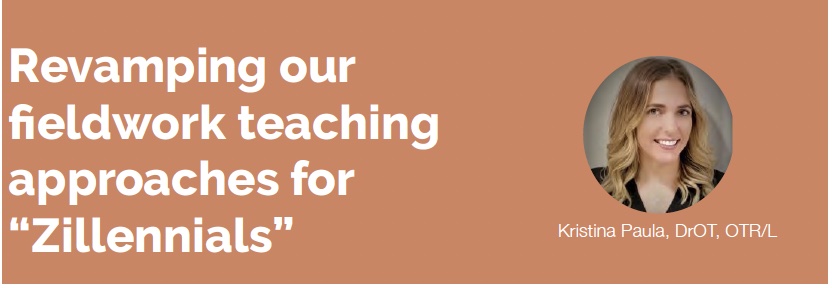
Have you ever spoken to fieldwork students and felt like it went in one ear and out the other? Well maybe because it has. Let’s take a step back and consider it from the student’s learning perspective; it is not due to their unwillingness to learn. Most universities have adopted an adult learning style to meet the learning needs of students from younger generations, however, fieldwork educators may continue to use the same teaching strategies from previous generations. As these students’ learning styles have evolved, we cannot continue to propose the same teaching styles we used 15, 10, or even 5 years ago. As occupational therapists, we adapt our therapeutic use of self to meet the individual needs of our clients. Fieldwork educators must also adjust our therapeutic use of self to enhance our interactions with fieldwork students for their learning experience.
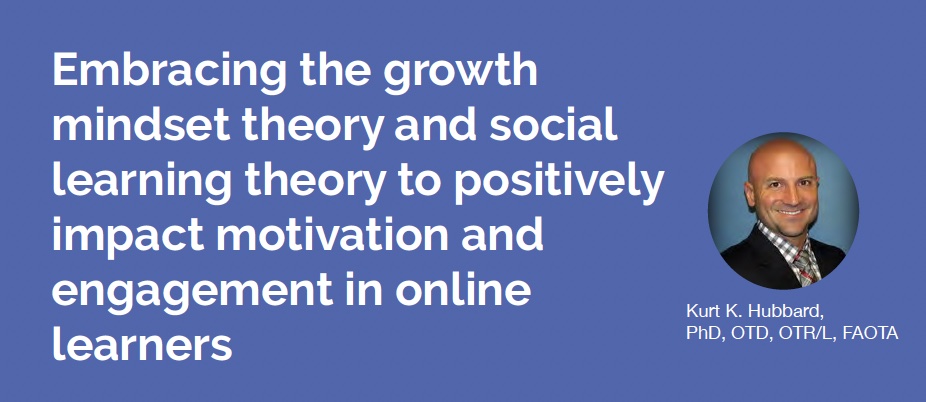
Online education refers to a learning process in which at least 80% of the course content is delivered via an online learning platform (Yeboah, Dogbey, & Smith, 2016). Hybrid education is a curriculum that has at least 50% of their delivery online. Increasingly, OT entry level programs are being delivered using hybrid curriculum. In addition, post-professional OT programs are primarily online in education delivery. According to the literature, enrollments in online education have grown rapidly in the past decade throughout postsecondary education (Jaggars, 2014). This growth offers learners opportunities, but also presents challenges for learners enrolled in online courses. For instance, despite the rapid growth in enrollment for online distance education courses, learner persistence and academic performance in online courses is often much lower than in traditional non-online courses (Croxton, 2014). Furthermore, according to Kauffman (2015), attrition rates remain high for online education courses as compared to traditional non-online distance education courses. Online education research studies have identified internal factors that lead to the underperformance for online learners (Croxton, 2014). These internal factors include lack of motivation, challenges with self-determination, and issues with not experiencing online engagement (Croxton, 2014). To this end, online college students who experience the least amount of motivation and engagement are said to be at a greater risk of dropping out (Pruett & Absher, 2015). It is of interest to identify ways the faculty can have an essential role in improving the motivation and engagement of online learners moving forward.
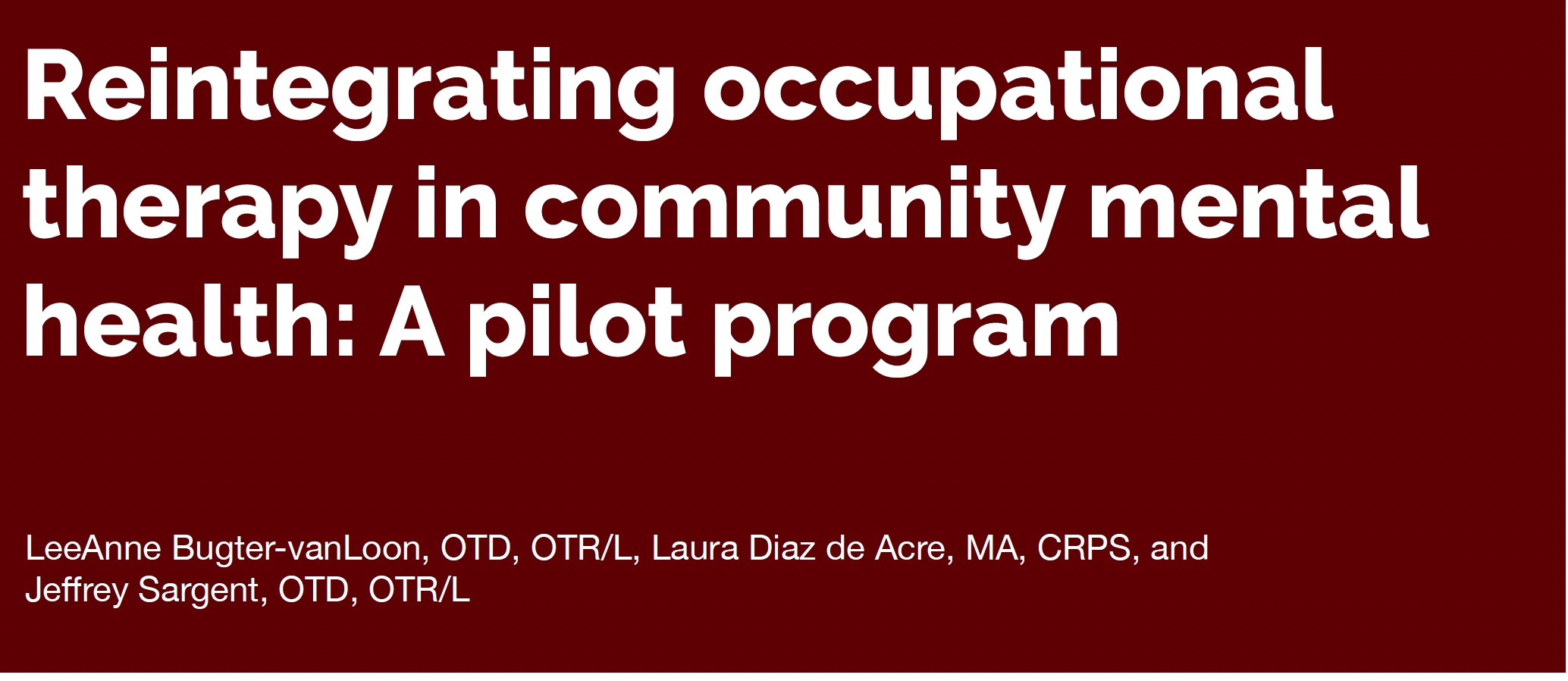
Current community-based mental health services in the state of Florida are sparse and focused on targeted areas, such as medication management, psychiatric services, trauma-based support groups, and day programming. Few programs or services facilitate community re-integration, and those that do, rely mainly on peer support services. The current continuum of care is not always able to account for the far-reaching effects of mental health and substance abuse issues and how they create obstacles to daily living and community participation. In Florida, mental health, substance abuse, and co-occurring disorder programs are under strain from a lack of funding. According to the State of Florida Appropriations Committee 2021 Annual Budget, only 7% of the allotted 3.8 billion dollars of funding to the Department of Children and Families is designated for community mental health and substance abuse services (The Florida Senate, 2022). These funds must stretch across all the programs and other related services. Funding for occupational therapy services is largely non-existent in these programs, despite a long history of treating this population. Occupational therapists (OTs) receive specialized education and clinical training to address areas within the continuum of community reintegration for clients experiencing mental health and co-occurring disorders. OTs can apply theory and conceptual models of practice stemming from a rich occupational science history to enable successful improvements in occupational participation and performance.
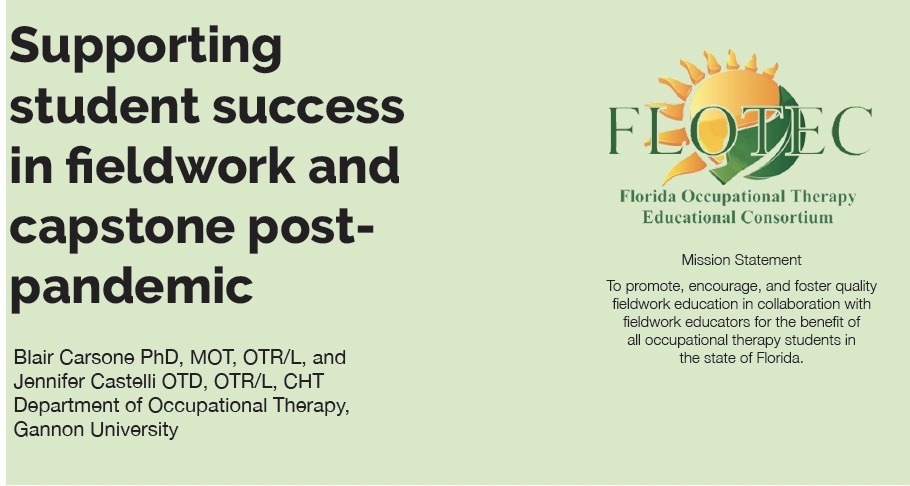
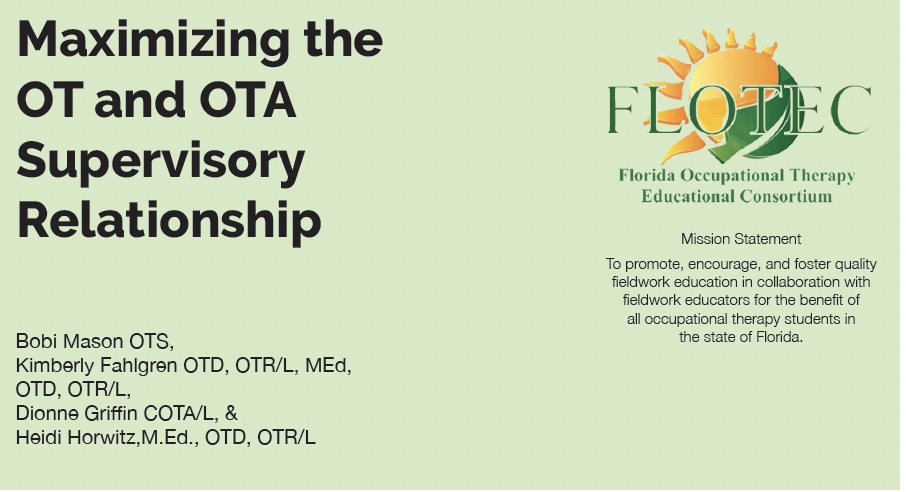
The Accreditation Council for Occupational Therapy Education (ACOTE®) standards and the Standards of Practice for Occupational Therapy identify the collaborative roles of OT/ OTA intraprofessional responsibilities (Accreditation Council for Occupational Therapy Education [ACOTE], 2018; American Occupational Therapy Association [AOTA], 2020, 2015). According to the American Occupational Therapy Association (AOTA, 2022), there are 16 occupational therapy and 20 occupational therapy assistant programs in Florida. The 2022 U.S. Bureau of Labor and Statistics Occupational Outlook Handbook reports 6,770 occupational therapists and 2,550 occupational therapy assistants licensed in Florida (U.S. Bureau of Labor Statistics, 2022). The employment rates for occupational therapy practitioners are growing exponentially, with an expected increase of 24% for OTAs and OT aides and 14% for OTs by 2031 (U.S. Bureau of Labor Statistics, 2022). With the growing demand for occupational therapy practitioners, the profession must ensure that OT and OTA students and practitioners have the knowledge and skills to promote quality supervisory and collaborative relationships to ensure best practices for our clients. This process should start in the educational environment.
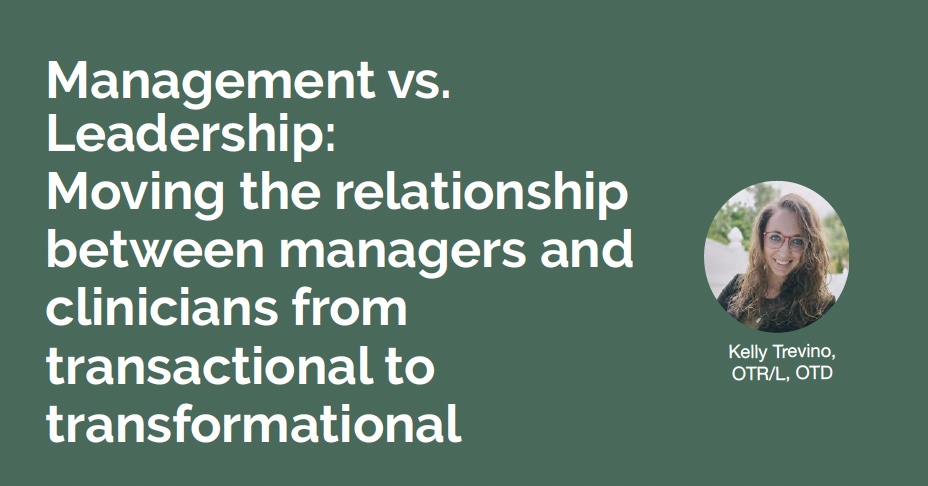
Holding a managerial position in a professional setting comes with a multitude of responsibilities. The skills required to successfully manage a group of professionals, large or small, are not skills that everyone possesses. With that being said, what constitutes a successful manager? What qualities make a manager the one who sticks out in your mind as someone who you looked to for guidance, or for whom you felt truly had your back? If you’re one who struggles to bring someone to mind, you’re not alone. This concept of a disconnect between management and staff has been a topic of discussion for decades. Research suggests that managers and practitioners have differing opinions about the performance of management, with management rating themselves significantly higher than their staff even though the only notable difference between the two groups is title (Brollier, 1985; Arroliga et al., 2014; Heard, 2014; Heard et al., 2018). The question to be posed then would be how can that gap be closed? Or at least lessened.
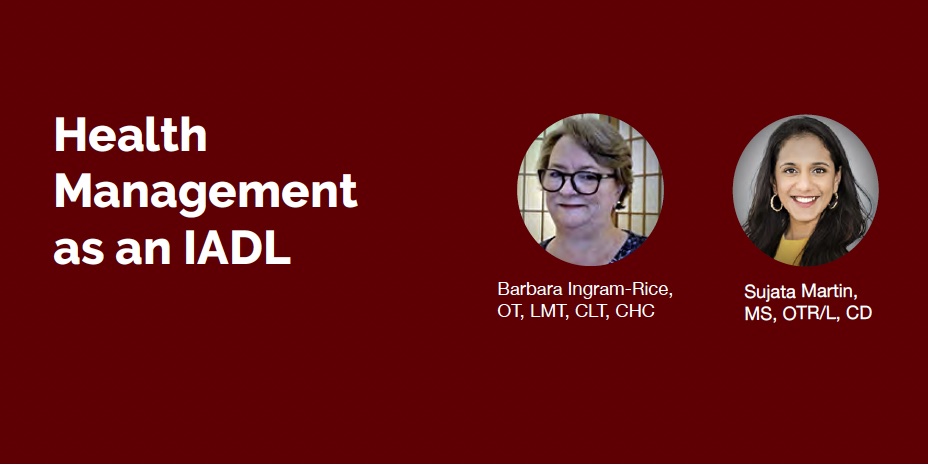
The updated Florida Occupational Therapy Practice Act defines health management as “therapeutic services designed to develop, manage, and maintain health and wellness routines” (The Florida Legislature, 2022). The American Occupational Therapy Association also de- fines it as an instrumental activity of daily living (IADL) in the Occupational Therapy Practice Framework (American Occupational Therapy Association [AOTA], 2020). The goal of health management is to improve or maintain health to support participation in occupations. The categories of health and wellness can be broken down into the following categories (AOTA, 2022):
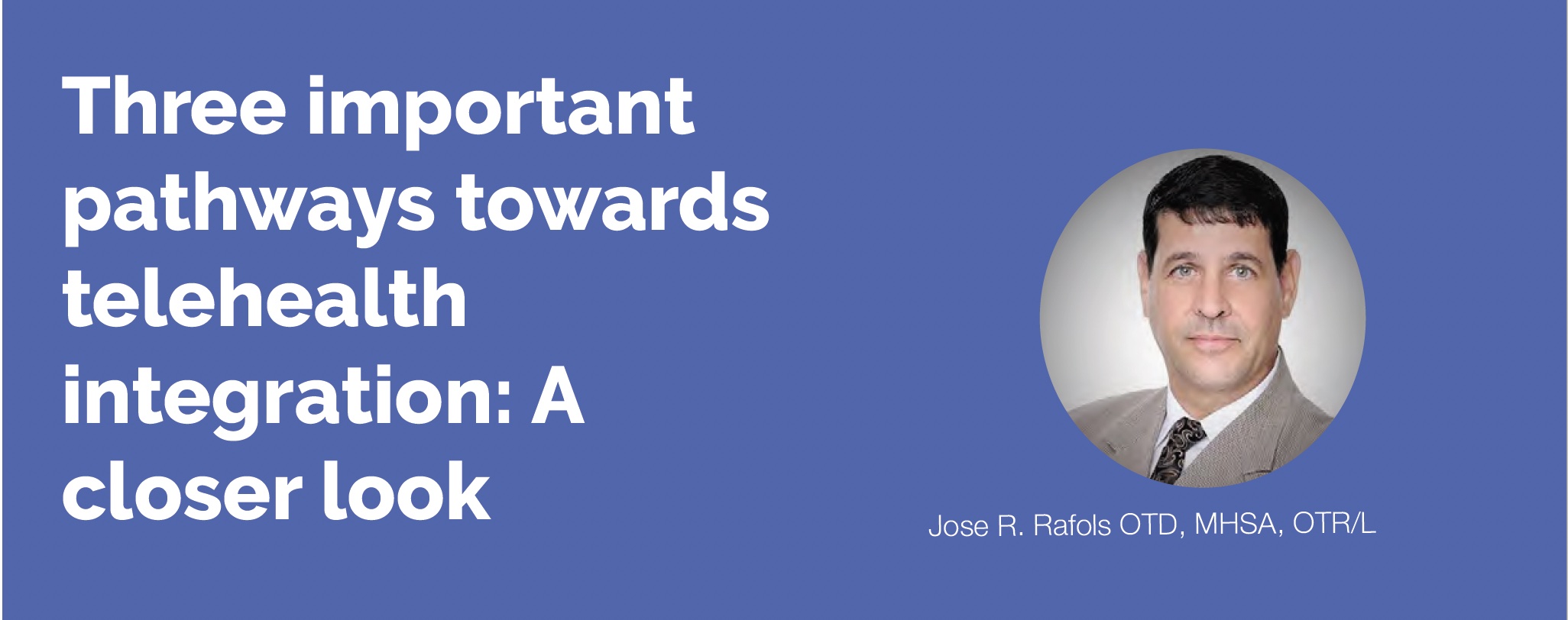
Integration of telehealth services occurs within several notable pathways. These pathways include academia, clinical practice, and mHealth, which included Connected Health Devices (CHDs) or Wearable Digital Devices (WDDs). Virtual pathways interconnect and add value to the healthcare industry in diverse and useful ways. Conversely, they do not work well when intentional integration is not taken seriously. The academic environment is a good place for telehealth instruction, as this exposes future providers to value-based virtual care and expands access to their beneficiaries (Dy Aungst & Patel, 2020; Muntz et al., 2021). There are many health care professions that are purposefully incorporating telehealth instruction within their curricula (Dy Aungst & Patel, 2020; Muntz et al., 2021). This mindful integration was spurred from the need to embed instruction on telehealth within traditional practice models (Muntz et al., 2021). Similarly, occupational therapy (OT) programs were offered to instruct students on telehealth through ACOTE standard B.4.15 which was authorized in the summer of 2020 (Patterson et al., 2021). However, this educational standard does not explicitly outline how telehealth may be leveraged by academicians to enhance greater adoption. (Hui et al., 2021; Patterson et al., 2021). Telehealth’s integration within the academic setting is essential as it exposes occupational therapy students to didactic instruction, hands-on learning, and virtual simulation experiences that foster greater interoperability within the clinical arena (Posey et al., 2020).
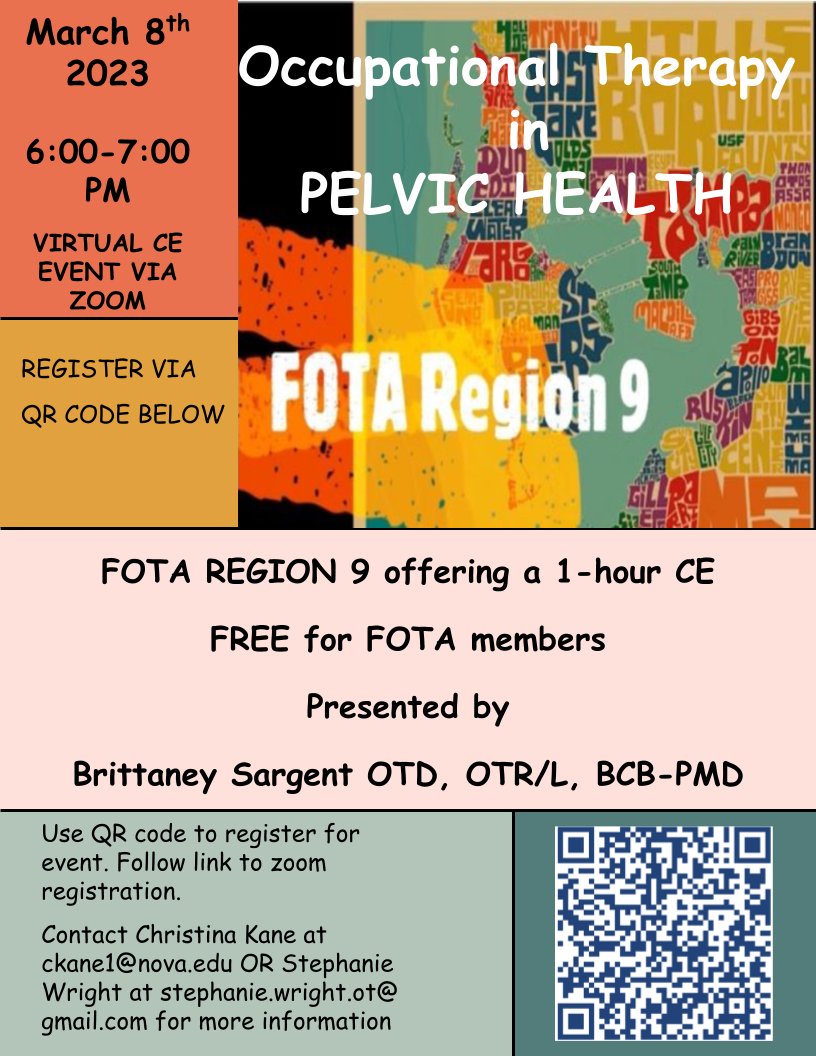
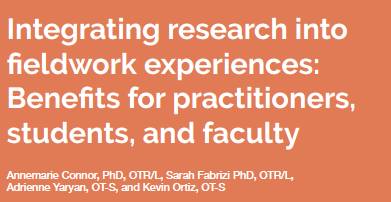 Integrating research into fieldwork experiences: Benefits for practitioners, students, and faculty
Integrating research into fieldwork experiences: Benefits for practitioners, students, and facultyby: Annemarie Connor, PhD, OTR/L, Sarah Fabrizi PhD, OTR/L, and Adrienne Yaryan, OT-S, and Kevin Ortiz, OT-S
As new occupational therapy programs continue to develop, it has become more difficult to find fieldwork (FW) sites for students since practitioners are less willing to supervise students due to the lack of resources, limited time, and questions of student preparedness (Varland et al., 2017). Unfortunately, this predicament is now exacerbated in the era of COVID-19. Emerging practice fieldwork sites, largely focused on prevention and health promotion in community-based practice, have been one mechanism for creating meaningful and productive fieldwork sites during this increasingly challenging landscape (Clarke et al., 2015; Dancza et al., 2013).
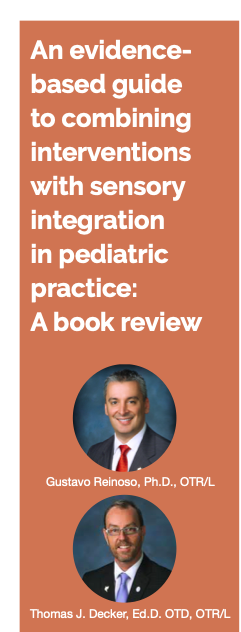
by: Gustavo Reinoso, Ph.D., OTR/L and Thomas J. Decker, Ed.D. OTD, OTR/L
Because of the complexity of the clients we assess and treat utilizing sensory integration, we often wonder about how we can best address a family’s needs by incorporating other approaches during our busy practices. The concept of combining and blending approaches is not new. In 1995, Blanche, Botticelli and Hallway published a textbook “Combining Neuro-Developmental Treatment and Sensory Integration principles: An Approach to Pediatric Practice.” The textbook was well-received among clinicians
by: Anette Bullard, MEd, COTA/L and Anjali Parti, OTD, OTR/L
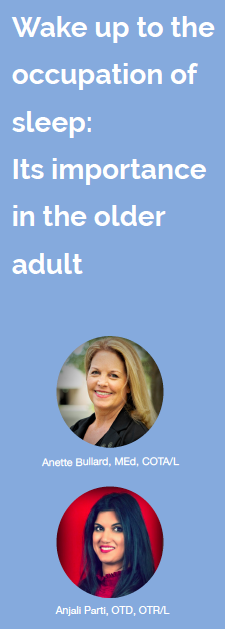 Everyone has experienced having to power through the day after a night of not sleeping well with every aspect of the day feeling more challenging due to your lack of sleep. The National Institute of Health (2017) identifies sleep as one of the most important occupations for maintaining all aspects of health. In fact, the Centers for Disease Control and Prevention (2018) has recognized sleep deprivation as a public health problem with broad, negative effects on safe occupational performance. For the older adults the challenges brought on by age compounded with a lack of sleep can further decrease successful occupational performance. Many age-related changes tend to disturb patterns of sleep and the myth that older adults need less sleep is actually incorrect (Suni, 2022b). The older adult is confronted with additional sleep obstacles such as, chronic conditions, medications, diminished physical activity, and decreased cognitive exercise, all of which have all been associated with decreases in sleep satisfaction. The resulting downward spiral of poor sleep results in less successful occupational engagement. The Occupational Therapy Practice Framework includes ‘rest and sleep’ as an area of occupation and defining occupational therapy practitioners as qualified professionals to assist clients with the occupation of rest and sleep (American Occupational Therapy Association, 2020). This brief article seeks to assist practitioners with identifying resources and awareness for more consistently addressing the occupation of sleep in the older adults.
Everyone has experienced having to power through the day after a night of not sleeping well with every aspect of the day feeling more challenging due to your lack of sleep. The National Institute of Health (2017) identifies sleep as one of the most important occupations for maintaining all aspects of health. In fact, the Centers for Disease Control and Prevention (2018) has recognized sleep deprivation as a public health problem with broad, negative effects on safe occupational performance. For the older adults the challenges brought on by age compounded with a lack of sleep can further decrease successful occupational performance. Many age-related changes tend to disturb patterns of sleep and the myth that older adults need less sleep is actually incorrect (Suni, 2022b). The older adult is confronted with additional sleep obstacles such as, chronic conditions, medications, diminished physical activity, and decreased cognitive exercise, all of which have all been associated with decreases in sleep satisfaction. The resulting downward spiral of poor sleep results in less successful occupational engagement. The Occupational Therapy Practice Framework includes ‘rest and sleep’ as an area of occupation and defining occupational therapy practitioners as qualified professionals to assist clients with the occupation of rest and sleep (American Occupational Therapy Association, 2020). This brief article seeks to assist practitioners with identifying resources and awareness for more consistently addressing the occupation of sleep in the older adults.
 Lymphedema Basics: Increasing Client Occupations
Lymphedema Basics: Increasing Client Occupationsby: Candice D. Young E.d.S., COTA/L, CLT
Increasing independence in occupations is what occupational practitioners are known for. For many experienced clinicians, it is a daily routine recognized through experience through evidence-based practices. However, many clients suffer from diseases uncontrolled by either primary or secondary causes resulting in delayed healing or ongoing therapy services. The growing anxieties of past medical history, congenital conditions, or surgeries are not always straightforward nor understandable, and the complications may be unknown. Lymphedema could be lurking in the foreseeable future for many with no current cure and awaiting breakthrough treatments (Schaverien and Aldrich (2018).
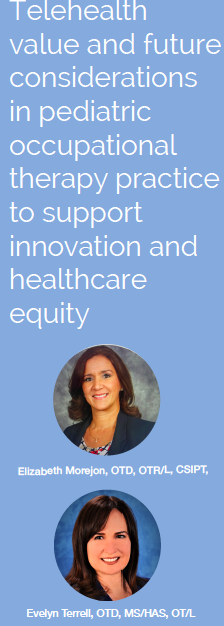 Telehealth value and future considerations in pediatric occupational therapy practice to support innovation and healthcare equity
Telehealth value and future considerations in pediatric occupational therapy practice to support innovation and healthcare equityby: Elizabeth Morejon, OTD, OTR/L, CSIPT, and Evelyn Terrell, OTD, MS/HAS, OT/L
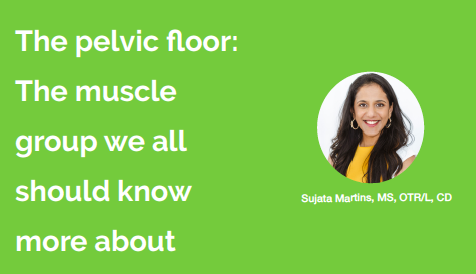 The pelvic floor: The muscle group we all should know more about
The pelvic floor: The muscle group we all should know more aboutby: Sujata Martins, MS, OTR/L, CD
Out of sight, out of mind is a common saying for most and unfortunately tends to be applied to the pelvic floor. By learning to take care of our pelvic floor, most of us can avoid embarrassing accidents, as well as spending money on incontinence products, medications, and even surgery. It is also extremely valuable for pregnant women in order to prepare for delivery and postpartum healing, and plays an important role in intimacy.
Amazon searches starting from www.flota.org benefit FOTA!